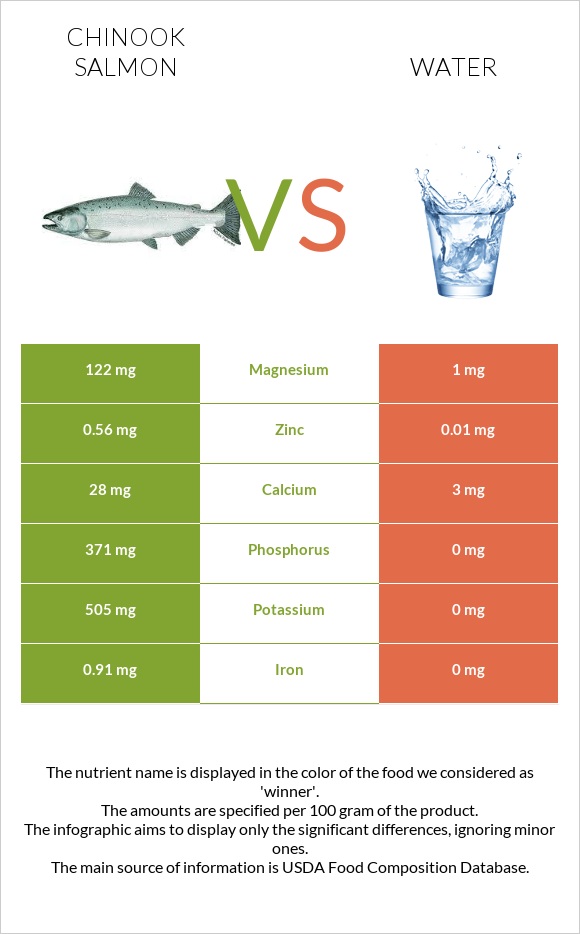Chinook salmon vs. Water — In-Depth Nutrition Comparison
Compare
Important differences between chinook salmon and water
- Chinook salmon has more phosphorus, magnesium, potassium, iron, and zinc than water.
- Chinook salmon's daily need coverage for phosphorus is 53% more.
The food varieties used in the comparison are Fish, salmon, chinook, cooked, dry heat and Beverages, water, tap, well.
Infographic

Infographic link
Mineral Comparison
Mineral comparison score is based on the number of minerals by which one or the other food is richer. The "coverage" charts below show how much of the daily needs can be covered by 300 grams of the food.
| Contains more MagnesiumMagnesium | +12100% |
| Contains more CalciumCalcium | +833.3% |
| Contains more PotassiumPotassium | +∞% |
| Contains more IronIron | +∞% |
| Contains more CopperCopper | +231.3% |
| Contains more ZincZinc | +5500% |
| Contains more PhosphorusPhosphorus | +∞% |
| Contains more ManganeseManganese | +∞% |
| Contains more SeleniumSelenium | +∞% |
| Contains less SodiumSodium | -91.7% |
Vitamin Comparison
Vitamin comparison score is based on the number of vitamins by which one or the other food is richer. The "coverage" charts below show how much of the daily needs can be covered by 300 grams of the food.
| Contains more Vitamin CVitamin C | +∞% |
| Contains more Vitamin AVitamin A | +∞% |
| Contains more Vitamin B1Vitamin B1 | +∞% |
| Contains more Vitamin B2Vitamin B2 | +∞% |
| Contains more Vitamin B3Vitamin B3 | +∞% |
| Contains more Vitamin B5Vitamin B5 | +∞% |
| Contains more Vitamin B6Vitamin B6 | +∞% |
| Contains more Vitamin B12Vitamin B12 | +∞% |
| Contains more FolateFolate | +∞% |
All nutrients comparison - raw data values
| Nutrient |  |
 |
DV% diff. |
| Vitamin B12 | 2.87µg | 120% | |
| Selenium | 46.8µg | 85% | |
| Vitamin B3 | 10.045mg | 63% | |
| Phosphorus | 371mg | 0mg | 53% |
| Protein | 25.72g | 0g | 51% |
| Vitamin B6 | 0.462mg | 36% | |
| Magnesium | 122mg | 1mg | 29% |
| Cholesterol | 85mg | 28% | |
| Fats | 13.38g | 0g | 21% |
| Polyunsaturated fat | 2.662g | 18% | |
| Vitamin A | 149µg | 17% | |
| Vitamin B5 | 0.865mg | 17% | |
| Potassium | 505mg | 0mg | 15% |
| Saturated fat | 3.214g | 15% | |
| Monounsaturated fat | 5.742g | 14% | |
| Calories | 231kcal | 0kcal | 12% |
| Vitamin B2 | 0.154mg | 12% | |
| Iron | 0.91mg | 0mg | 11% |
| Folate | 35µg | 9% | |
| Vitamin C | 4.1mg | 5% | |
| Zinc | 0.56mg | 0.01mg | 5% |
| Copper | 0.053mg | 0.016mg | 4% |
| Vitamin B1 | 0.044mg | 4% | |
| Calcium | 28mg | 3mg | 3% |
| Sodium | 60mg | 5mg | 2% |
| Manganese | 0.019mg | 0mg | 1% |
| Tryptophan | 0.288mg | 0% | |
| Threonine | 1.127mg | 0% | |
| Isoleucine | 1.185mg | 0% | |
| Leucine | 2.09mg | 0% | |
| Lysine | 2.362mg | 0% | |
| Methionine | 0.761mg | 0% | |
| Phenylalanine | 1.004mg | 0% | |
| Valine | 1.325mg | 0% | |
| Histidine | 0.757mg | 0% | |
| Omega-3 - EPA | 1.01g | N/A | |
| Omega-3 - DHA | 0.727g | N/A | |
| Omega-3 - DPA | 0.296g | N/A |
Macronutrient Comparison
Macronutrient breakdown side-by-side comparison
Protein:
25.72 g
Fats:
13.38 g
Carbs:
0 g
Water:
65.6 g
Other:
0 g
Protein:
0 g
Fats:
0 g
Carbs:
0 g
Water:
99.9 g
Other:
0.1 g
| Contains more ProteinProtein | +∞% |
| Contains more FatsFats | +∞% |
| Contains more WaterWater | +52.3% |
| Contains more OtherOther | +∞% |
~equal in
Carbs
~0g





